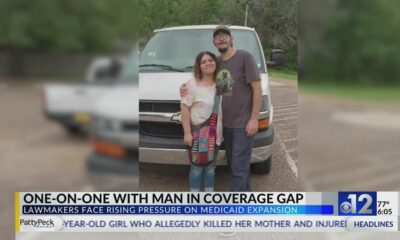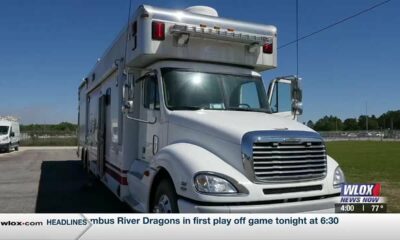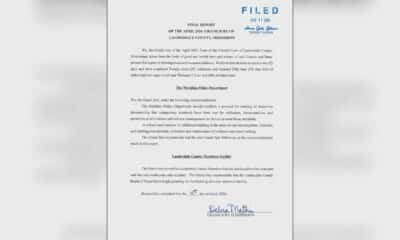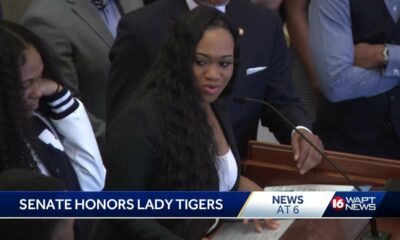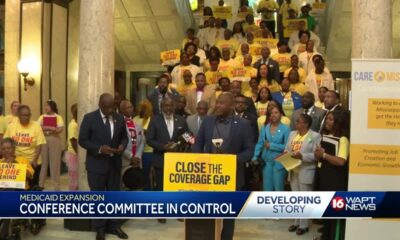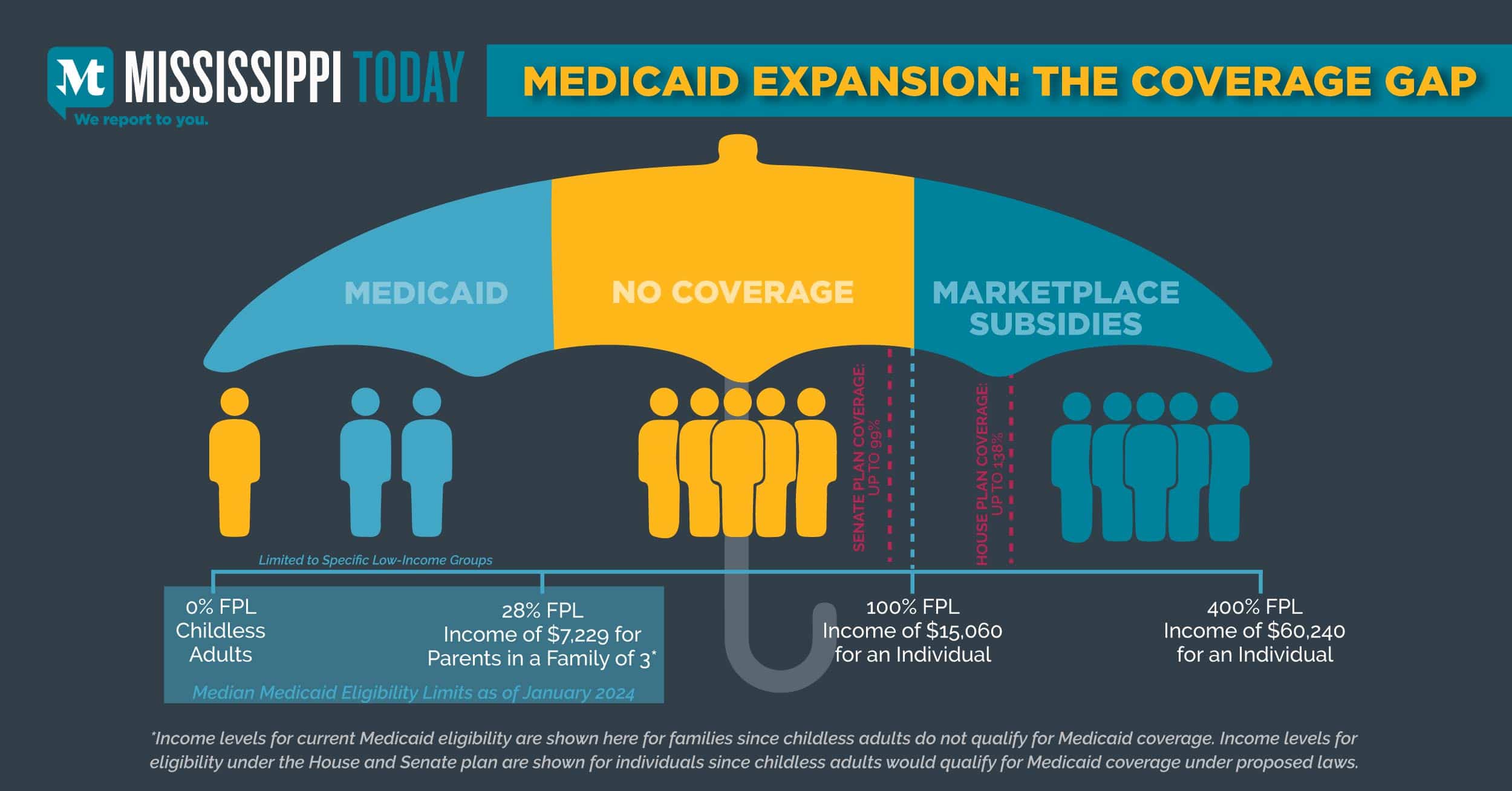Mississippi Today
Democrats: Ignore ‘blue slip’ custom to get federal vacancies filled in Republican states like Mississippi
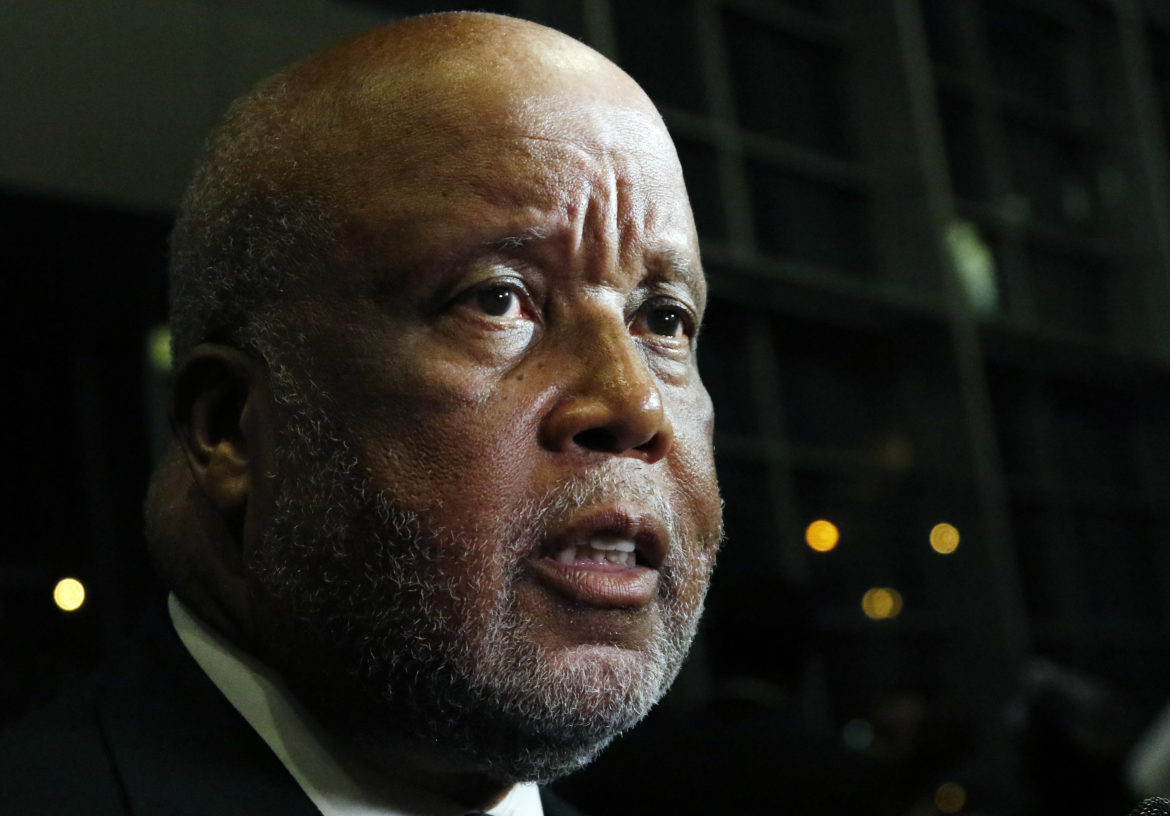
Democrats: Ignore ‘blue slip' custom to get federal vacancies filled in Republican states like Mississippi
U.S. Rep. Bennie Thompson, D-Miss., and other Democrats in Washington are urging President Joe Biden to send federal appointments for the U.S. Senate's approval, regardless of prior consent from senators in the nominees' respective states.
Biden would have to ignore a longstanding tradition called “blue slips” – forms that senators submit to the Senate Judiciary Committee to affirm they'll vote to approve the president's candidates for vacancies in their home state.
This matters most in states with one or more Republican senators who are withholding their blue slips, stalling Biden's nominations from moving through confirmation.
“It's a custom rather than anything that's in law. So it's really a gray area. And in this instance, people who support Democrats are getting penalized in this process,” Thompson, the only Democrat in the state's congressional delegation, told Mississippi Today on Tuesday.
Mississippi has five federal vacancies. In the fall, Biden made nominations for four of the positions – federal judge for the Northern District, U.S. attorney for the Southern District and two U.S. marshals – but Sens. Roger Wicker and Cindy Hyde-Smith did not return blue slips for any of them. Biden had to recently reissue the nominations, along with dozens more in other states, to the current Congress on Jan. 23. Biden has not made a nomination for the U.S. attorney in the Northern District.
Biden's nominations include Scott Colom, a district attorney in north Mississippi, for the U.S. district judge in the Northern District; Todd Gee, deputy chief of the Public Integrity Section of the U.S. Department of Justice, for U.S. attorney in the Southern District; Dale Bell for U.S. marshal in the Southern District; and Michael Purnell for U.S. marshal in the Northern District.
Gee, a Vicksburg native, would oversee the office currently prosecuting the Mississippi welfare fraud case involving the misspending or theft of at least $77 million in federal funds intended to serve the poor.
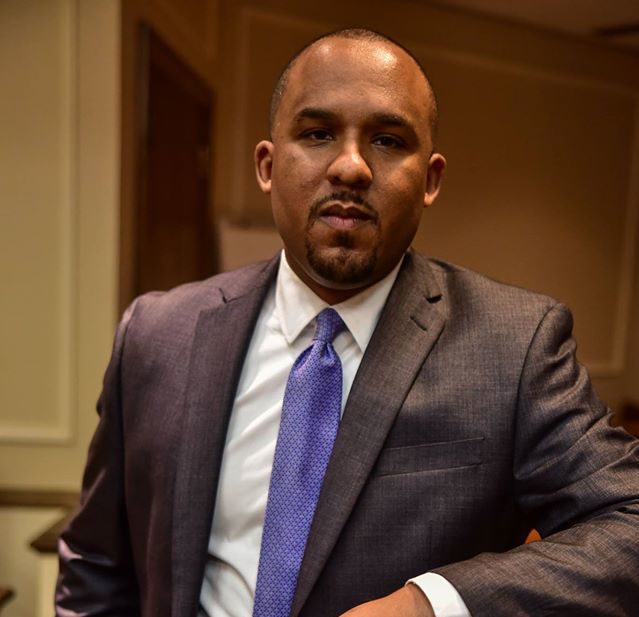
Colom, a Columbus resident, has been the district attorney for the 16th Judicial District, which consists of Lowndes, Oktibbeha, Noxubee and Clay counties, since 2016. He previously worked for the Mississippi Center for Justice and was a municipal court judge.
Wicker has voiced his support for Colom, but that does not appear to have hastened the confirmation process for the district attorney.
“All of a sudden, people who build a career, do what's right in the community, exhibit leadership traits that other people can identify with, and get an opportunity to be elevated to a higher level based on the hard work that they've done over their careers, and politics denies them of that opportunity,” Thompson said. “And we are a better country than that.”
A spokesperson for Wicker would not say whether the senator supported Biden's nominations, directing Mississippi Today's questions to the White House and Senate Judiciary Committee. Hyde-Smith's office did not return Mississippi Today's email Tuesday.
The White House did not respond to an email Wednesday.
There is no official rule or procedure in Congress requiring the use of blue slips, Thompson said.
And there is some precedent for rejecting the custom. President Donald Trump did away with blue slips for his judicial appointments to circuit courts of appeals, the second highest courts behind the U.S. Supreme Court.
“My personal view is that the blue slip, with regard to circuit court appointments, ought to simply be a notification of how you're going to vote, not the opportunity to blackball,” then-Senate Majority Leader Mitch McConnell, R-Ky., said in a 2017 interview with The New York Times.
In remarks on the Senate floor Tuesday, Minority Leader McConnell ridiculed Biden's judicial nominees.
Some Democrats are arguing that the president's party should not use the failure of Republican senators to return blue slips as a reason to become complacent about unfilled vacancies.
“I think they (Democrats) have basically allowed the custom to get in the way of excellent people being able to serve in those prestigious positions,” Thompson said. “I think they are acquiescing to an arcane custom that, in this instance, has no basis in law to start with.”
Nationally, discussion around stalled federal appointments has focused on judicial vacancies, considering the power that these lifetime appointments hold in shaping legal precedent and influencing public policy. Currently there are 88 total judge vacancies and 41 pending nominations.
But the U.S. attorney and U.S. marshal vacancies are consequential in their own right.
Thompson backs the nomination of Gee, who previously served as lead counsel on the House Homeland Security Committee that Thompson chaired.
If confirmed, Gee will inherit Mississippi's blockbuster welfare scandal, in which two key defendants have pleaded guilty and flipped to aid the prosecution.
But since the initial arrests in 2020, federal authorities have not criminally charged any additional people. Sources close to the probe have questioned whether the U.S. Attorney's Office is likely to take the step of charging new figures in the case before gaining a permanent leader.
And yet, when asked about the welfare investigation, Wicker told WLOX in August, “It's not something I can have any effect on in Washington.”
“This is a state matter,” Wicker said in the WLOX report, which was following Mississippi Today's reporting about Gov. Tate Reeves' connections to welfare purchases targeted in ongoing civil litigation. “It's just not something that I'm really qualified to talk about.”
Last year, Thompson wrote a letter to the U.S. Department of Justice, following the revelations in Mississippi Today's series “The Backchannel,” urging federal authorities to investigate former Gov. Phil Bryant's role in welfare misspending.
“The Backchannel” revealed for the first time that welfare payments made to former NFL quarterback Brett Favre's pharmaceutical company Prevacus – the Florida company at the center of the initial criminal indictment – were made in plain sight of Bryant, and that Bryant even agreed to accept stock in the company after leaving office.
While the 2020 charges by Hinds County District Attorney Jody Owens described illegal activity regarding investments into the drug company, officials concealed information about Bryant's involvement from the public until Mississippi Today published private text messages between Bryant, Favre and the founder of Prevacus last April.
“The fact that 100% of the TANF monies involved were federal monies means that the U.S. Attorney's Office should have been aggressively prosecuting those individuals. And that has not been the case,” Thompson said. “They have actually deferred to the state office to handle federal prosecutions. And there's a question as to whether or not Hinds County has the resources to pursue all of the areas necessary in that suit. I'm convinced that the investment of those TANF monies that went into the Florida drug company really need to be pursued. But you've got to have the staff on board or the reach, like a U.S. attorney's office in Florida, to pass it off with the FBI and others to investigate it and bring it back. I'm just not certain that a local district attorney's office has the reach or the finances … to give it what it needs.”
While the local district attorney's office is still a partner in the ongoing investigation, the U.S. Attorney's Office in the Southern District is the lead prosecutor. It is the office that most recently secured a guilty plea on new federal charges against the former welfare director, John Davis, in September.
But more than two years into Biden's administration, the office still lacks a permanent leader at its helm.
“It means that the single largest criminal action that occurred in our state is being haphazardly pursued in a manner that all the people who are guilty and involved, potentially, will never get brought to trial, because of that lack of leadership in the Southern District office,” Thompson said.
“Look, if we can prosecute single women in Mississippi for food stamp fraud, surely we can prosecute everybody involved in a multimillion dollar scam of federal funds,” he added.
This article first appeared on Mississippi Today and is republished here under a Creative Commons license.
Mississippi Today
Mississippi Capitol sees second day of hundreds rallying for ‘full Medicaid expansion now’

Hundreds of people rallied at the Mississippi Capitol for a second day Wednesday, urging lawmakers to expand Medicaid to provide health coverage for an estimated 200,000 Mississippians.
After faith leaders spoke at the Capitol on Tuesday, Care4Mississippi, a coalition of advocates, held a rally Wednesday. Speakers recounted their struggles with access to affordable health care in Mississippi and chanted for the Legislature to, “Close the coverage gap now,” and for “Full Medicaid expansion now.”
Stephanie Jenkins of McComb, a former social worker, lost her job and health insurance after a car wreck left her with debilitating injuries.
She said she later received some medical treatment from the University of Mississippi Medical Center, but still suffers from chronic pain and other ailments. She said she was told she could not receive Medicaid coverage because she owns too much property.
Jenkins said that years after her accident, “I'm still fighting that battle. I'm still trying to get health insurance. I am still trying to get Medicaid … The state of Mississippi does not realize that it is not about money. It is not about race. It is about people. People are dying because they have no health insurance.”
Dr. Randy Easterling, a Vicksburg family physician and former executive director of the Mississippi Medical Association, spoke in favor of Medicaid expansion. He said the people who would be helped by the expansion primarily work at jobs that do not provide health care and they do not earn enough to purchase private insurance. Many are small business owners.
Easterling said often times the insurance policies available through the federal marketplace exchange have out-of-pocket costs that make them unaffordable for working people if they get sick.
Easterling recounted a story of two of his friends diagnosed with similar cancers. One was uninsured and self-employed, and did not get early diagnosis or treatment. He's now in hospice and on death's door. The other friend, with insurance, received an early diagnosis and treatment and is now cancer free.
“This is a matter of life and death. It is certainly more than a political debate,” Easterling told the crowd.
But the issue of expanding Medicaid is currently engulfed in the political process of the Mississippi Legislature. The House has passed a bill to expand Medicaid as is allowed under federal law to cover those earning up to 138% of the federal poverty or about $20,000 annually for an individual. Under the House plan, the federal government would pay 90% of the health care costs and provide the state with almost $700 million more over the first two years as incentive to expand Medicaid as 40 other states have done.
READ MORE: Experts analyze House, Senate Medicaid expansion proposals, offer compromise plan
Under the Senate plan, coverage would be provided to working people earning less than 100% of the federal poverty level and the federal government would pay much less of the costs.
Studies indicate that the Senate plan would cost the state more and cover fewer people. At the rally, people wore yellow T-shirts that read, “close the coverage gap” and “leave no one behind.”
Easterling said that by refusing to expand Medicaid for the last 11 years, “This state has struck a match to $12 billion … and that money was earmarked specifically to increase access to health care.”
He added, “Two days ago most of us wrote a check to the IRS. Now explain to me in simple terms, I am pretty simple, why my (federal) tax money in Mississippi went to increase access to health care in 40 states and not any of it came back to Mississippi.”
“We take federal money right and left,” Easterling said. “We take hundreds of millions of federal dollars for highways, education, the Health Department, law enforcement and natural disasters … But for some reason we push back on additional money for health care. I would submit to you this is a matter of life and death.”
Robin Y. Jackson, with the Mississippi Black Women's Roudtable, told of dropping out of school to care for a family member. In the process she developed a chronic health problem. She said she was unable to get help, but later got a job with health insurance even though her employer knew she had costly medical maladies. After surgeries costing tens of thousands of dollars, she said she is finally well.
“I was lucky,” she said. Others are not so lucky. She said with Medicaid expansion everyone could receive the treatment she was lucky enough to receive.
She said as shepherds of Mississippians, politicians should strive “to leave no one behind.”
Sonya Williams Branes, a former legislator, a small business owner and state policy director for the Southern Poverty Law Center, recounted the struggles she faced with her young son who had chronic asthma. As a small business owner at the time, she struggled to provide health care for her family and her employees.
“To ensure my son remained eligible for CHIP, a program that provided him with vital medical care, I was forced into a corner,” Barnes said. “Making more money, expanding my business and hiring more staff – all paths to improving our lives – would disqualify him from the program, pushing essential health care out of reach.
“Our system is broken,” Barnes said. “It punishes ambition and stifles growth.”
Before the Care4Mississippi rally, the Legislative Black Caucus on Wednesday morning held a press conference calling for adoption of the House's more expansive Medicaid coverage plan.
“We remain committed to having full expansion and covering as many working Mississippians as possible,” said House Minority Leader Robert Johnson, D-Natchez. “Our goal is to sustain health care in Mississippi and sustain it in a way that it doesn't matter where you live or what your income is.”
This article first appeared on Mississippi Today and is republished here under a Creative Commons license.
Mississippi Stories
Mississippi Stories: Natalie Moore
Mississippi Stories: Natalie Moore
In this episode of Mississippi Stories, Mississippi Today Editor-at-Large Marshall Ramsey sits down with Natalie Moore, Peer Wellness Support Services Coordinator for the Mississippi Mental Health Association. Moore and Ramsey share their experiences battling mental health issues and the Congregational Recovery Outreach Program's upcoming mental health summit.
CROP is a faith-based, grant program that aims to help individuals recovering from substance use disorders and mental illnesses.
This article first appeared on Mississippi Today and is republished here under a Creative Commons license.
Mississippi Today
On this day in 1863
April 17, 1863

As darkness fell on San Francisco, a young Black woman named Charlotte Brown walked a block from her home on Filbert Street and took a seat on the “whites-only” horse-drawn streetcar.
She and her family had moved to California from Maryland, a part of the city's burgeoning Black middle class. Her father, James E. Brown, was an anti-slavery crusader and was a partner in the Black newspaper, Mirror of the Times.
When the conductor came to collect tickets, she handed him the ticket she had purchased, only for him to refuse to take it.
“He replied that colored persons were not allowed to ride,” she later testified. “I told him I had been in the habit of riding ever since the cars had been running. I answered that I had a great ways to go and I was later than I ought to be.”
The conductor asked her several times to leave. Each time she refused. When a white woman objected to her presence, the conductor grabbed her by the arm and forced her off the streetcar. She boarded twice more with the same result and sued.
Two years later, a jury awarded her the huge sum in her day of $500 (streetcar tickets were just 5 cents), and a judge ruled that barring passengers on the basis of race was illegal. He wrote in his ruling that he had no desire to “perpetuate a relic of barbarism.”
Her victories paved the way for the official end of racial discrimination on streetcars in San Francisco and beyond.
This article first appeared on Mississippi Today and is republished here under a Creative Commons license.
-
Mississippi News4 days ago
Mississippi will soon be bombarded with cicadas
-
SuperTalk FM2 days ago
4 tornadoes touched down in Mississippi during latest round of severe storms
-
SuperTalk FM3 days ago
2 Jones County correctional officers arrested in smuggling bust
-
Mississippi News5 days ago
Columbus schools may see needed upgrades with bond issue
-
Local News3 days ago
Almost 3,500 Mississippi Veterans have enrolled in VA health care in past 365 days, 28% increase over last year
-
SuperTalk FM12 hours ago
Chance of parole denied for man who killed 3 Choctaw Indian tribal members
-
SuperTalk FM6 days ago
Explosion at elementary school in Mississippi Delta hospitalizes two employees
-
SuperTalk FM2 days ago
Amazon project in Madison County to be over $10B, create more jobs than projected: report




